By Moinafatima Soilihi Himidi
More than 4.4 million people are struggling in crisis and emergency food security levels in northeast Nigeria, that part of the country worst-hit by the Boko Haram conflict.
The population has suffered high level of malnutrition, arising from the Boko Haram conflict, in an already poor area where agriculture have been disrupted by fightings which intensified towards the end of last year. Northeast of Nigeria has seen food insecurity and malnutrition rates rising intensely as a result of the fightings.
The majority of food and seed stocks have been useless, looted or destroyed, and many of the 1.8 million people have fled their homes because of the conflict and had to be left with what little stocks they had. Displacement has left many families with no means of earning a living.
The United Nations Children Fund (UNICEF), the World Food Programme (WFP) and Action against Hunger (AAH) get to work together to provide families in that particular part of the country greater access to food and to protect children from malnutrition.
It was announced recently (29 November 2016) that over a hundred thousand families in conflict-hit northeast Nigeria have been reached so far with food and nutrition support of US$20 million extended to the population.
œWe are building a system not only to treat children for malnutrition, but to help families who have been devastated by the conflict to prevent their children from becoming malnourished in the future, said  UNICEF Representative in Nigeria, Mohamed Fall.
Due to this crisis, UNICEF in collaboration with the primary health-care agencies of the Government of Nigeria will carry out a three-year project which will provide vitamin and mineral supplements for mothers and children, funding for families with severely malnourished children to buy nutritious food, treatment for children with diarrhoea, and advice for pregnant and breastfeeding mothers on how they can provide the best possible nutrition for their children.
œThe fact that this is a multi-year commitment, it enables us not only to save childrens lives today, but to provide families and the most vulnerable young children with protection from malnutrition in the future as well, said the UNICEF representative.
The project, which began in April 2016 and runs through March 2019, has already treated 30,000 children for severe acute malnutrition. More than 100,000 pregnant women have received iron folate; 60,000 children have been treated for diarrhoea, 350,000 children have been given vitamin A supplements, boosting their immune systems and helping to protect them from illnesses such as pneumonia, which are frequently fatal in the area. ***
